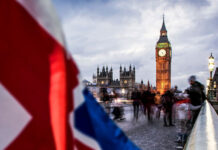Inflation hit 7% in the 12 months to March 2022, according to the latest figure from the Office of National Statistics (ONS) released today.
The shift marked a rise from the 6.2% rate of inflation reported from February, with analysts warning that the worst is yet to come with an anticipated peak of 8.4% this winter.
The rapid CPI climb was reportedly the highest rate since the National Statistics series began in January 1997.
Consumers have felt the biggest shocks across energy and food expenses, with the Bank of England noting that UK credit card borrowing was at its highest level since records began, indicating that a rising number of households have found themselves pushed to the edge of financial security.
“Households are fending off exorbitant energy and food bills, and with no relief in sight, consumer confidence has fallen,” said Killik and Co partner Rachel Winter.
“To add to the mix, interest rates have risen, and April brought about a national insurance hike.”
“With inflation expected to reach 8% over the coming months, it’s important to make savings work as hard as possible.”
Fuel prices played a major role in the spiking CPI, as the price per litre for petrol rose over 12p and diesel surpassed an 18p hike over March.
The sanctions against Russia continued to see the country’s 4 million barrels of oil per day cut off from global supply, with US President Joe Biden’s provision of one million barrels per day from the US Strategic Petroleum Reserve doing little to fill the gap in demand.
“Motorists winced every time they had to fill up their vehicles and the Chancellor’s duty cut has done little to soothe,” said AJ Bell financial analyst Danni Hewson.
“Russia’s invasion of Ukraine has clearly played a part as real sanctions or those self-imposed, disrupted supply of oil and sent the price of a barrel of the black stuff soaring.”
The other sectors of the economy suffered substantial blows, with prices rising at the fastest rate since records began.
Clothing and footwear prices surged 9.7%, household equipment spiked 10.4% and food costs rose by 5.9%.
Consumer savings have also suffered a decline in value over recent years, with the escalating price of products and services across the board eroding the real terms worth of household budgets.
“Current conditions will be particularly hard for those relying on cash savings, which are at a real risk of losing value in ‘real terms’ as inflation rises,” said abrdn client director Colin Dyer.
“To put this into perspective, £10,000 of savings in cash put away five years ago could now buy £800 less today – value that has just been wiped away by inflation’s attrition.”
Despite the dire news, experts warned the there are worse shocks to brace for on the horizon.
The current inflation figures do not reflect the rising price cap, or the knock-on effect that the extra £700 per year in energy bills will have on household budgets.
“What’s causing most concern is the realisation that this really is just a taste of what is to come,” said Hewson.
“The next set of inflation figures will reflect the shock most households have been feeling when they’ve taken a look at their new energy bill.”
Everybody is going to feel poorer as wages, pensions and benefits all fail to keep up. But most people also understand that those with the least will be hardest hit because for some people cutting back is simply not an option.”





